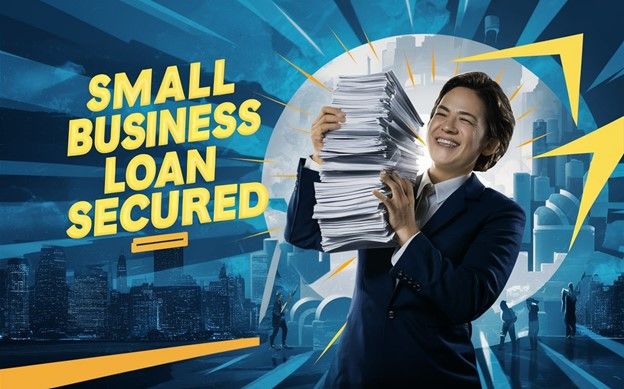

Starting or expanding a small business can be one of the most exciting — and challenging — experiences for any entrepreneur. But when it comes to financing, the choices can quickly become overwhelming. Whether you’re launching a new venture, upgrading equipment, or bridging a cash flow gap, understanding how business loans work is essential.
One of the first questions you’ll face is: “Is my small business loan secured or unsecured?”
The answer matters because it affects your approval odds, borrowing limits, interest rates, and risk exposure. In this detailed guide, we’ll explain the differences between secured and unsecured small business loans, the pros and cons of each, and how to decide which type best fits your business goals.
When lenders provide funding to small businesses, they assess risk — and that’s where “secured” and “unsecured” come in.
Both serve valuable purposes — the key is knowing when to use each.
A secured small business loan requires you to pledge something valuable — known as collateral — in exchange for funding. Common examples include real estate, vehicles, accounts receivable, or inventory.
By providing collateral, you reduce the lender’s risk, which usually leads to lower interest rates and higher borrowing limits.
Secured loans are ideal for businesses planning long-term investments, such as purchasing new property, renovating a facility, or upgrading production equipment.
An unsecured business loan does not require collateral. Instead, approval is based on creditworthiness — a combination of your business credit score, personal credit score, and cash flow strength.
Unsecured loans tend to have faster approval but come with higher interest rates since lenders assume more risk.
Unsecured funding works best for businesses with consistent monthly revenue that need quick, short-term capital to manage growth or cash flow gaps.
| Factor | Secured Loan | Unsecured Loan |
|---|---|---|
| Collateral Required | Yes | No |
| Interest Rate | Lower | Higher |
| Loan Amount | Larger | Smaller |
| Approval Time | Slower | Faster |
| Credit Requirement | Moderate | Strong |
| Risk to Borrower | Loss of asset | Damage to credit score |
| Best For | Long-term growth | Short-term cash flow |
Every business has unique financing needs, so choosing the right loan depends on your financial profile and goals.
If your business owns property, vehicles, or equipment, you may qualify for a secured loan with better terms.
For example, a restaurant owner could use kitchen equipment as collateral for expansion funding.
But if you lack valuable assets or want to avoid risking them, an unsecured loan may be safer — even at a higher rate.
Credit scores are crucial. A business credit score above 680 improves your chances of approval and lowers your rate.
Lenders often review both personal and business credit, especially for newer businesses.
If your credit is solid, unsecured loans might be a fast and flexible solution. But if your credit needs work, a secured loan backed by collateral could still open the door to funding.
Ask yourself: Am I comfortable pledging assets for better terms?
Secured loans reduce costs but put property at risk if payments fall behind.
Unsecured loans, on the other hand, safeguard assets but increase borrowing costs.
Balancing cost, speed, and safety will guide your choice.
Aligning loan type with business purpose ensures efficient capital use and easier repayment.
If neither secured nor unsecured loans seem like the right fit, consider these alternative financing options:
| Option | What It Offers |
|---|---|
| Grants | Free funds that don’t require repayment. Ideal for startups and community-focused ventures. |
| Crowdfunding | Raise money from supporters online in exchange for rewards or early product access. |
| Venture Capital | Equity investment for high-growth businesses ready to scale. |
| Angel Investors | Individual investors who offer both funding and mentorship. |
| Peer-to-Peer Lending | Borrow directly from individuals through online platforms. |
| Invoice Financing | Use unpaid invoices to get immediate working capital. |
| Business Credit Cards | Short-term revolving credit line for everyday expenses. |
| Microloans | SBA-backed or nonprofit loans up to $50,000 for small or new businesses. |
These options can help bridge funding gaps, especially for startups or businesses not yet ready for bank loans.
Before choosing your financing path, consider these three essential factors:
If you’re ready to get started, call us now!
At Small Business Assets & Capital (SBAC Funding), we specialize in helping small businesses access the right financing solutions — fast.
Whether you’re looking for a secured business loan for equipment, an unsecured working capital loan, or an alternative funding option, we make the process simple and transparent.
📞 Call or Text Us: 847-600-9660
💬 Or Schedule a Free Consultation today to discover the funding path that fits your goals.
Secured loans require collateral (like property or inventory), while unsecured loans are based on creditworthiness and cash flow.
Yes, especially for larger loan amounts. Collateral reduces lender risk and can lead to lower interest rates.
Secured loans usually offer lower interest rates. Unsecured loans, being higher risk, often come with higher rates but faster approvals.
Yes, some loans — especially SBA and lines of credit — can have variable rates that adjust with market trends.
They offer higher limits, longer terms, and lower rates — great for large projects or equipment purchases.
Unsecured loans rely on your business’s financial health and credit profile rather than collateral. They are ideal for fast, flexible funding.
A small business loan can be either secured or unsecured, depending on your needs and qualifications.
At SBAC Funding, we help entrepreneurs across the U.S. access the financing they need to start, expand, or stabilize their businesses.
Whether you’re purchasing new equipment, hiring staff, or covering seasonal expenses — we make business funding faster, simpler, and more flexible.
📞 Call or Text: 847-600-9660
🌐 Visit SBACFunding.com to get started today.
If you’re ready to get started, call us now!